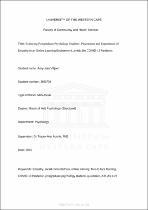| dc.description.abstract | Empathy is conceptualised as the human ability to feel, and also to navigate, various social situations successfully. Empathy, as a construct, is often defined as having both affective and cognitive aspects, however, researchers and scholars alike, have yet to agree upon a single approach, as to how empathy develops. Thus far, the literature has discussed empathy as a social skill that can be learned over time. However, there is limited research regarding the impact that the physical environment has, on empathy development across cultures and contexts. Hence, this study aims to address the current debates within the literature regarding the construct of empathy, and how it develops, within a multicultural context. The multicultural context in which this study was conducted is of utmost importance, as this particular environment, during the COVID-19 Pandemic, did not allow for social connection and interaction. Therefore, how empathy develops under these limited social conditions remained the focus of this study. | en_US |

